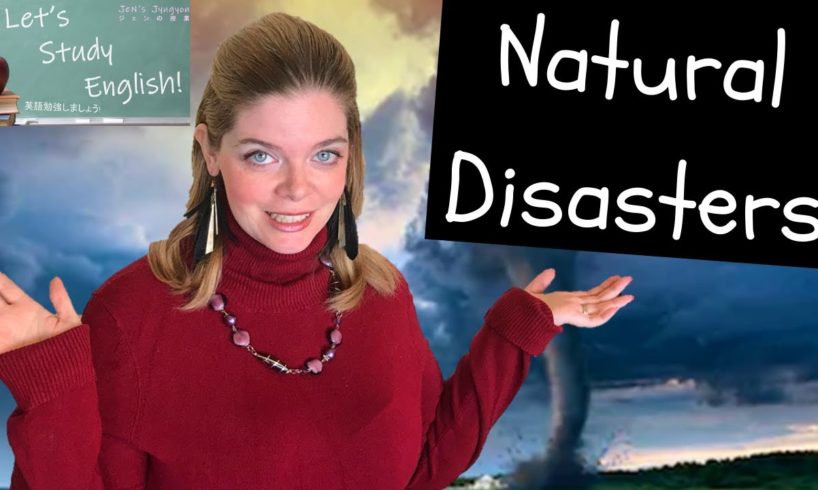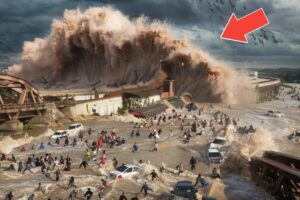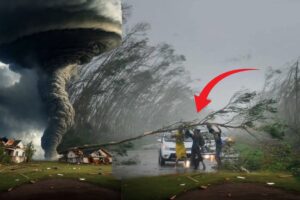
You should never underestimate the forces of nature. Natural disasters have powerful effects on our world. An Earthquake with a high magnitude can cause a destructive tsunami and a devastating hurricane can cause a massive flood. Natural disasters can be terrifying! In today’s English lesson you will learn useful vocabulary connected to natural disasters to help improve your English fluency and communicate easier in English.
What is a natural disaster? A natural disaster is a catastrophic event which is caused by the natural processes in nature, the natural processes of the earth. It is not man made, but it has a huge effect on people and causes great damage, destruction, and even loss of life. This lesson will provide you with valuable English vocabulary used to talk about natural disasters. Expanding your vocabulary is key to improving your English fluency. This lesson includes nine natural disasters and a variety of useful English expressions.
There are nine types of natural disasters that we will discuss in this English vocabulary lesson:
1. Wildfire (Bushfire, Forest fire)
2. Flood
3. Drought
4. Earthquake
5. Tsunami
6. Hurricane (Cyclone, Typhoon)
7. Tornado (Twister)
8. Volcanic Eruptions
9. Avalanche (Snowslide) / Landslide (Mudslide)
In addition, you will learn essential vocabulary that you can use to improve your English speaking connected to natural disasters. You will encounter these natural disaster words in the news a lot, and this vocabulary is usually on English proficiency tests such as IELTS, TOEFL, CELPIP, EIKEN, and more. Learning this vocabulary will help you to improve your English skills and sound more like a native English speaker. In this lesson you will learn the following words to talk about natural disasters:
Destruction, Suffer, Damage, Drown, Precipitation, Agriculture, Starve, Famine, Quake, Tectonic plates, Epicentre, Magnitude, Richter scale, Tremors, Eye of the storm, Spiralling, Twisting, Erupt, Lava, Ash, Debris, and more!
By the end of today’s English lesson you will have learned lots vocabulary to help you talk about natural disasters like a native English speaker. Thank you for watching, “Let’s talk about Natural Disasters in English! Natural Disaster Vocabulary Essential for IELTS!” I hope this vocabulary lesson will be useful for you as you improve your English communication skills. Good luck with your English studies!
Subscribe for more English lessons just like this every Monday and Friday: https://www.youtube.com/c/JeNsJyugyouジェンの授業?sub_confirmation=1
For more Intermediate – Advanced English Lessons click here: https://www.youtube.com/playlist?list=PLktdXyVCSbc8NrLoilBtwviDGZzVw5PVs
For more useful vocabulary about the environment (good for tests like IELTS), watch this environment vocabulary lesson: https://youtu.be/JfpsKPEAkWw
In this lesson you could hear the weather collocations ‘strong wind’, ‘heavy rain’, and others. Learn more weather collocations in this lesson: https://youtu.be/n0Vuws2GiB8
#LetsStudyEnglish #JeNsJyugyou #Disasters #Vocabulary
source







Question of the Day: Have you ever experienced a natural disaster?
My answer: From these nine examples of natural disasters I have only ever experienced earthquakes. I lived in Japan teaching English from 2009 – 2013 and there were quite a few minor earthquakes during that time. The huge earthquake in March 2011 (magnitude 9.1) was very scary, but luckily the area where I was living was about 270km away and is a completely landlocked prefecture so there was no danger of a tsunami. There were rotating power outages for several weeks, but the Japanese government did a good job of scheduling the power outages and providing the essential information to everyone, including translating it into English for foreigners living in the affected areas. The aftershocks were also rather frightening, but I am so grateful that both my friends in Japan and I were all safe following the disaster. How about you?
Thank you for your excellent 授業. I've never experienced these natural disasters luckily. I was not affected by the 2011 Tohoku earthquake directly. I lived in a place where the seismic intensity was about 4.
But Japan in which natural disasters occurred anywhere every year, that's why I think I'm going to experience a natural disaster someday.
I took an hour to write this sentences. Writing is so hard.
Hi ma'am you are nice teacher.
Hola ??
It was really useful for me, thank you ❤️
I'm going to eighth grade in Turkey and I just have to say, your channel has improved my English and helped me with my school work a lot. So thank you so much for everything ❤?
Wow very useful information thanks
I'm your new subscriber ??
Great content ❤️❤️❤️
Thank u I used your video in my presentation ❤️
Jaja,no sé inglés
Can you say bye to my friend perina?
Nice video, it was actually shown to us in english class, i know english somewhat decently but i did learn some extra things about hurricanes and earthquakes, many thanks!
Thx You 😀
Nope I have never experienced a natural disasters but let me tell you something. I went to the beach. . . You know to have some fun and when I was swimming a big wave shoved my feet. . . If you know what I'm talking about ?
Thank you for your dedication
No mames no entiendo ni madres ???
HAHAHA primer comentario en español
No hay un traductor ?
I came here to learn english, i end up learning more science.
I actually took one of them , and explained in my class ?
thank you ma'am
I’ve been watching english on utube & ur my 2nd teacher on my list that I found intelligent & straight 4ward lessons Tnx teacher
No teniendo mi madres nosé ingles ??
Thank you mam
I love u r videos they r so useful ???
Güzel gözüküyor ama bı ? anlamadım
One like for mams teaching and explaining thank you mam
Keep up this good work ……… so interesting ……….. we need more from you ???
Pani I.P. mi kázala pozrieť si vaše video a vy tam ani nemáte slovenský preklad do p*č* a ja jak k*k*t to musím prekladať
No entendi ni madres xd
Thank you you are fantastic
Japanese: Why are we having so many disasters??
Your images and explanations of each natural disaster is very good. Thanks